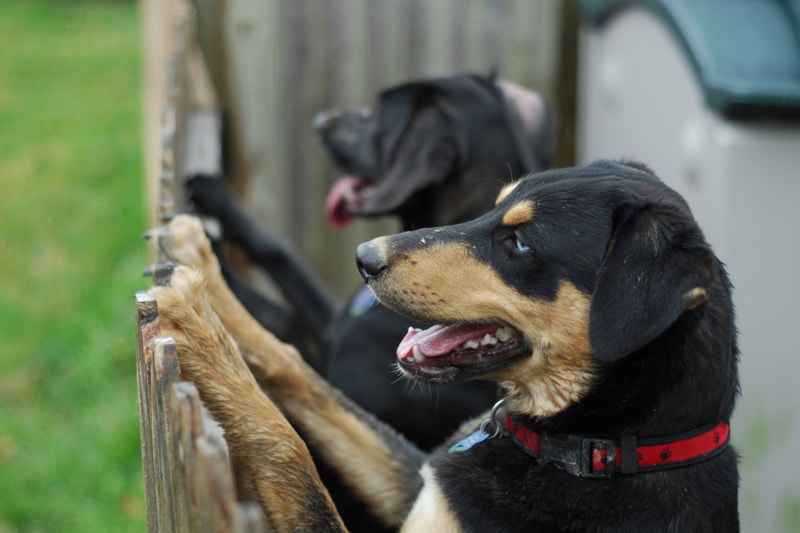
When the mail person arrives, the dog barks. When another dog walks down the sidewalk, the dog barks. Squirrel in the yard? The dog barks. Sound familiar to anyone? If so, your dog is displaying signs of being territorial. Don't worry, though. While different breeds show various signs and levels of aggressive territorial behaviors, it's a natural behavior that dogs have displayed for… well, as long as dogs have been around.
Territorial behaviors are a survival instinct. Guarding territory and hoarding resources like food, toys, and other items they value are behaviors that have been engrained in dogs for centuries because having these resources improves their odds of survival. However, if your dogs are like mine and spend a significant amount of time indoors on the couch, threats against their survival – including sharing their toys with each other – are few and far between.
While some territorial behaviors are beneficial, like alerting their pet parents to potential threats, such as strangers, others are less useful. Here are a few tips for working with your dog on adjusting some territorial behaviors.

What Causes Aggressive Territorial Behaviors?
Aside from instincts, there are several factors that can cause a dog to display territorial behaviors. The lack of early socialization, sexual maturation, environmental factors, inbreeding, pack mentality, or an underlying medical condition can all lead to aggressive territorial behaviors.
If you think your dog has an underlying medical issue at the root of their aggressive behavior, you should visit your veterinarian for a professional diagnosis. Need help finding a veterinarian? Here’s our vet finder!
Signs of Territorial Behavior
Aggressive territorial behaviors can manifest in different ways and at different times. It's also important to note that biting isn't the only form of aggressive territorial behavior. In fact, there are many warning signs of territorial behaviors that happen before a dog bites. Some of the signs of aggressive territorial behavior include:
- Freezing in place
- Growling
- Aggressive barking
- Snapping
- Lunging
- Biting
While each of these behaviors is alarming and a cause for concern, there are ways to address the situation. In fairness, you will probably never be able to completely "cure" your pooch, but you can work together to build better behaviors.

What to Do About Territorial and Aggressive Behaviors
Once you acknowledge that your pal may be aggressive, you can work together to manage these behaviors and improve your relationship. Before you begin developing these skills by working with your dog, it's important to understand that dog training is a long process and it can be frustrating at times. It is best to take a slow and steady approach and to manage your expectations. That said, here are few tips for toning down the aggressive territorial behavior:
- Start with basic obedience. Teaching your pal some basic obedience skills can be useful during tense situations and they serve as a building block for future training.
- Develop strong recall skills. Simply put, this is training your dog to come when they are called. It is one of the most important skills they can develop. You should train them to come when called in all environments, but start working on this behavior indoors. As your pal progresses with their recall skills, you can take the training into the yard using a long leash.
- Teach them that "Nothing in Life Is Free." After you've put in the time and feel comfortable that your dog has a solid grasp on the basic behaviors, you can move on to something called "Nothing in Life Is Free" training. This means teaching your pooch that all resources come from you. It's reward-based training that requires your dog to work for the resources (food, treats, etc.) they desire. This helps teach territorial dogs, who tend to feel entitled to treats and food, that they must earn their resources.
- Help them learn to be quiet. Many territorial dogs back up and make noise when they perceive a threat to their territory. Teaching your dog to be quiet requires the use of a command word that tells them that they need to be calm. Start the training indoors and then introduce additional distractions as they progress.
- Reduce their overall anxiety. As much as training can help – and it can help a lot – there's a good chance that, if your dog is territorial, they're probably experiencing a high level of anxiety. There are several items you can purchase to help address your pal's anxiety: These items include: puzzle toys, calming collars, compression shirts, and long-lasting chew toys. Medicine is also available for dogs with anxiety, but you will need to discuss this with your veterinarian to determine whether or not this approach is right for your dog.

Urine Marking
Another territorial behavior that dogs practice is urine and fecal marking (though fecal marking is considerably less common). This is the classic example of a dog marking their territory and should not be confused with potty training issues. There are several reasons a dog may mark their territory. Your pooch may be inclined to do some urine marking if:
- They identify the scent of another dog on a certain object
- There's a new item brought into the home
- They are clashing with other pets within the home
- They are reestablishing their territory
- They have not been spayed or neutered and are in heat
There are, of course, other reasons a dog might urine mark, but these are among the more common culprits behind urine marking. It is also important to make sure that an underlying medical condition isn't causing the urination. If you suspect that there may be a medical problem, it's important to have a veterinarian evaluate your pooch for any health-related issues.
How to Prevent Urine Marking
While it's certainly not fun to think about, there are a few ways you can address the behavior of urine marking. Be sure to have your dog spayed or neutered, if you haven't already. This may stop the behavior entirely. Here a few other tips for addressing territorial marking:
- Clean up immediately after your dog urine marks
- Keep your pal away from areas they previously urine marked
- Use positive reinforcement when introducing new items, people, or pets into the home
- Watch for the signs your dog displays prior to urine marking and dissuade the behavior
It's important not to punish your dog for urine marking. They won't understand what they're doing wrong or why they're being punished. Working with them to change the behavior is a more effective approach to discouraging urine marking.

Living With a Territorial Dog
Owning a territorial dog, especially one that exhibits aggressive behaviors, can be stressful for any pet parent. It is also stressful for your dog. That's why it's important to work with your pal on developing healthy behaviors and alternatives to aggressive territorial behavior. Please remember that training your dog is a long-term process that requires a lot of work, but the end result can be well worth your time.
The information presented in this article is for educational and informational purposes only and does not constitute or substitute for the advice of your veterinarian.
Helpful resources for pet parents
Browse categories
-

At-Home Pet Wellness Check-Ins
Between your pet’s yearly veterinary appointments, practice these at-home wellness options for their nails, teeth, skin, and coat.
-

Dog Nail Care
Get all your canine nail care questions answered and learn some helpful tips for grooming your pup’s paws.
-

The "Silent Killer": Symptoms of Heart Disease in Cats
Heart disease in cats can be the "silent killer." Learn how to spot the symptoms.

Browse Categories
(opens new window)
